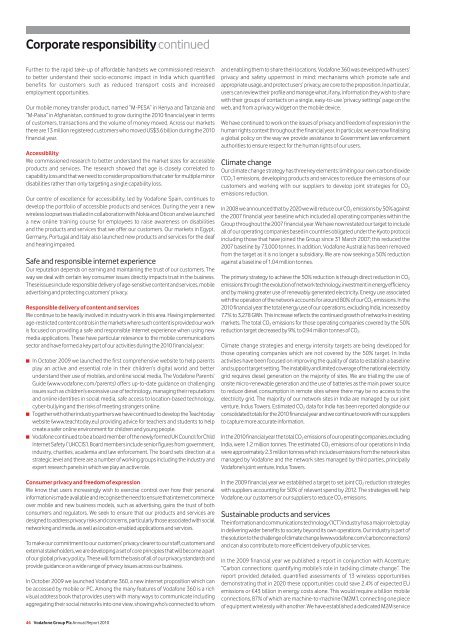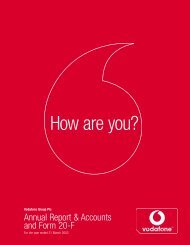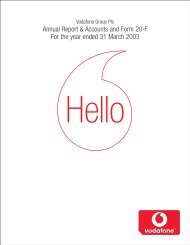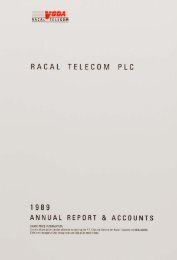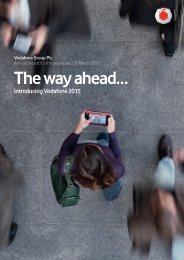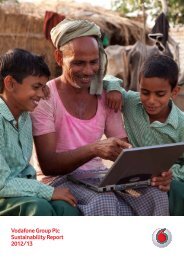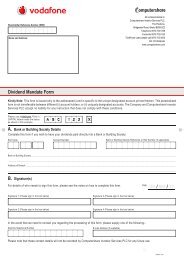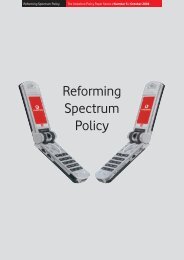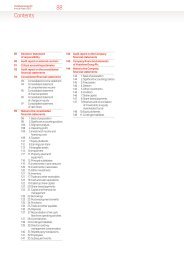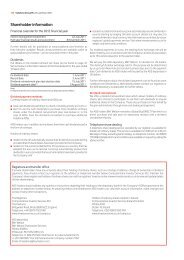UNITED STATES SECURITIES AND EXCHANGE ... - Vodafone
UNITED STATES SECURITIES AND EXCHANGE ... - Vodafone
UNITED STATES SECURITIES AND EXCHANGE ... - Vodafone
Create successful ePaper yourself
Turn your PDF publications into a flip-book with our unique Google optimized e-Paper software.
Corporate responsibility continued<br />
Further to the rapid take-up of affordable handsets we commissioned research<br />
to better understand their socio-economic impact in India which quantified<br />
benefits for customers such as reduced transport costs and increased<br />
employment opportunities.<br />
Our mobile money transfer product, named “M-PESA” in Kenya and Tanzania and<br />
“M-Paisa” in Afghanistan, continued to grow during the 2010 financial year in terms<br />
of customers, transactions and the volume of money moved. Across our markets<br />
there are 13 million registered customers who moved US$3.6 billion during the 2010<br />
financial year.<br />
Accessibility<br />
We commissioned research to better understand the market sizes for accessible<br />
products and services. The research showed that age is closely correlated to<br />
capability loss and that we need to consider propositions that cater for multiple minor<br />
disabilities rather than only targeting a single capability loss.<br />
Our centre of excellence for accessibility, led by <strong>Vodafone</strong> Spain, continues to<br />
develop the portfolio of accessible products and services. During the year a new<br />
wireless loopset was trialled in collaboration with Nokia and Oticon and we launched<br />
a new online training course for employees to raise awareness on disabilities<br />
and the products and services that we offer our customers. Our markets in Egypt,<br />
Germany, Portugal and Italy also launched new products and services for the deaf<br />
and hearing impaired.<br />
Safe and responsible internet experience<br />
Our reputation depends on earning and maintaining the trust of our customers. The<br />
way we deal with certain key consumer issues directly impacts trust in the business.<br />
These issues include responsible delivery of age-sensitive content and services, mobile<br />
advertising and protecting customers’ privacy.<br />
Responsible delivery of content and services<br />
We continue to be heavily involved in industry work in this area. Having implemented<br />
age-restricted content controls in the markets where such content is provided our work<br />
is focused on providing a safe and responsible internet experience when using new<br />
media applications. These have particular relevance to the mobile communications<br />
sector and have formed a key part of our activities during the 2010 financial year:<br />
■ In October 2009 we launched the first comprehensive website to help parents<br />
play an active and essential role in their children’s digital world and better<br />
understand their use of mobiles, and online social media. The <strong>Vodafone</strong> Parents’<br />
Guide (www.vodafone.com/parents) offers up-to-date guidance on challenging<br />
issues such as children’s excessive use of technology, managing their reputations<br />
and online identities in social media, safe access to location-based technology,<br />
cyber-bullying and the risks of meeting strangers online.<br />
■ Together with other industry partners we have continued to develop the Teachtoday<br />
website (www.teachtoday.eu) providing advice for teachers and students to help<br />
create a safer online environment for children and young people.<br />
■ <strong>Vodafone</strong> continued to be a board member of the newly formed UK Council for Child<br />
Internet Safety (‘UKCCIS’). Board members include senior figures from government,<br />
industry, charities, academia and law enforcement. The board sets direction at a<br />
strategic level and there are a number of working groups including the industry and<br />
expert research panels in which we play an active role.<br />
Consumer privacy and freedom of expression<br />
We know that users increasingly wish to exercise control over how their personal<br />
information is made available and recognise the need to ensure that internet commerce<br />
over mobile and new business models, such as advertising, gains the trust of both<br />
consumers and regulators. We seek to ensure that our products and services are<br />
designed to address privacy risks and concerns, particularly those associated with social<br />
networking and media, as well as location-enabled applications and services.<br />
To make our commitment to our customers’ privacy clearer to our staff, customers and<br />
external stakeholders, we are developing a set of core principles that will become a part<br />
of our global privacy policy. These will form the basis of all of our privacy standards and<br />
provide guidance on a wide range of privacy issues across our business.<br />
In October 2009 we launched <strong>Vodafone</strong> 360, a new internet proposition which can<br />
be accessed by mobile or PC. Among the many features of <strong>Vodafone</strong> 360 is a rich<br />
visual address book that provides users with many ways to communicate including<br />
aggregating their social networks into one view, showing who’s connected to whom<br />
46 <strong>Vodafone</strong> Group Plc Annual Report 2010<br />
and enabling them to share their locations. <strong>Vodafone</strong> 360 was developed with users’<br />
privacy and safety uppermost in mind: mechanisms which promote safe and<br />
appropriate usage, and protect users’ privacy, are core to the proposition. In particular,<br />
users can review their profile and manage what, if any, information they wish to share<br />
with their groups of contacts on a single, easy-to-use ‘privacy settings’ page on the<br />
web, and from a privacy widget on the mobile device.<br />
We have continued to work on the issues of privacy and freedom of expression in the<br />
human rights context throughout the financial year. In particular, we are now finalising<br />
a global policy on the way we provide assistance to Government law enforcement<br />
authorities to ensure respect for the human rights of our users.<br />
Climate change<br />
Our climate change strategy has three key elements: limiting our own carbon dioxide<br />
(‘CO2’) emissions, developing products and services to reduce the emissions of our<br />
customers and working with our suppliers to develop joint strategies for CO2<br />
emissions reduction.<br />
In 2008 we announced that by 2020 we will reduce our CO2 emissions by 50% against<br />
the 2007 financial year baseline which included all operating companies within the<br />
Group throughout the 2007 financial year. We have now restated our target to include<br />
all of our operating companies based in countries obligated under the Kyoto protocol<br />
including those that have joined the Group since 31 March 2007; this reduced the<br />
2007 baseline by 73,000 tonnes. In addition, <strong>Vodafone</strong> Australia has been removed<br />
from the target as it is no longer a subsidiary. We are now seeking a 50% reduction<br />
against a baseline of 1.04 million tonnes.<br />
The primary strategy to achieve the 50% reduction is through direct reduction in CO2<br />
emissions through the evolution of network technology, investment in energy efficiency<br />
and by making greater use of renewably generated electricity. Energy use associated<br />
with the operation of the network accounts for around 80% of our CO2 emissions. In the<br />
2010 financial year the total energy use of our operations, excluding India, increased by<br />
7.7% to 3,278 GWh. This increase reflects the continued growth of networks in existing<br />
markets. The total CO2 emissions for those operating companies covered by the 50%<br />
reduction target decreased by 9%, to 0.94 million tonnes of CO2.<br />
Climate change strategies and energy intensity targets are being developed for<br />
those operating companies which are not covered by the 50% target. In India<br />
activities have been focused on improving the quality of data to establish a baseline<br />
and support target setting. The instability and limited coverage of the national electricity<br />
grid requires diesel generation on the majority of sites. We are trialling the use of<br />
onsite micro-renewable generation and the use of batteries as the main power source<br />
to reduce diesel consumption in remote sites where there may be no access to the<br />
electricity grid. The majority of our network sites in India are managed by our joint<br />
venture, Indus Towers. Estimated CO2 data for India has been reported alongside our<br />
consolidated totals for the 2010 financial year and we continue to work with our suppliers<br />
to capture more accurate information.<br />
In the 2010 financial year the total CO2 emissions of our operating companies, excluding<br />
India, were 1.2 million tonnes. The estimated CO2 emissions of our operations in India<br />
were approximately 2.3 million tonnes which includes emissions from the network sites<br />
managed by <strong>Vodafone</strong> and the network sites managed by third parties, principally<br />
<strong>Vodafone</strong>’s joint venture, Indus Towers.<br />
In the 2009 financial year we established a target to set joint CO2 reduction strategies<br />
with suppliers accounting for 50% of relevant spend by 2012. The strategies will help<br />
<strong>Vodafone</strong>, our customers or our suppliers to reduce CO2 emissions.<br />
Sustainable products and services<br />
The information and communications technology (‘ICT’) industry has a major role to play<br />
in delivering wider benefits to society beyond its own operations. Our industry is part of<br />
the solution to the challenge of climate change (www.vodafone.com/carbonconnections)<br />
and can also contribute to more efficient delivery of public services.<br />
In the 2009 financial year we published a report in conjunction with Accenture:<br />
“Carbon connections: quantifying mobile’s role in tackling climate change”. The<br />
report provided detailed, quantified assessments of 13 wireless opportunities<br />
demonstrating that in 2020 these opportunities could save 2.4% of expected EU<br />
emissions or €43 billion in energy costs alone. This would require a billion mobile<br />
connections, 87% of which are machine-to-machine (‘M2M’), connecting one piece<br />
of equipment wirelessly with another. We have established a dedicated M2M service


